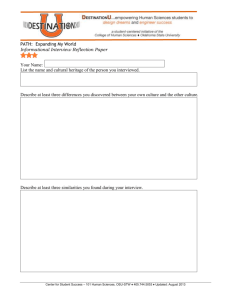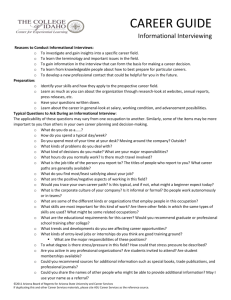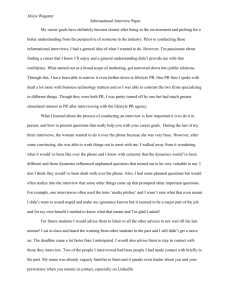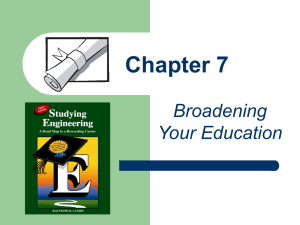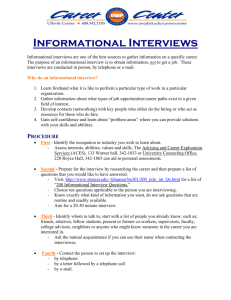Job Shadowing and Informational Interviewing
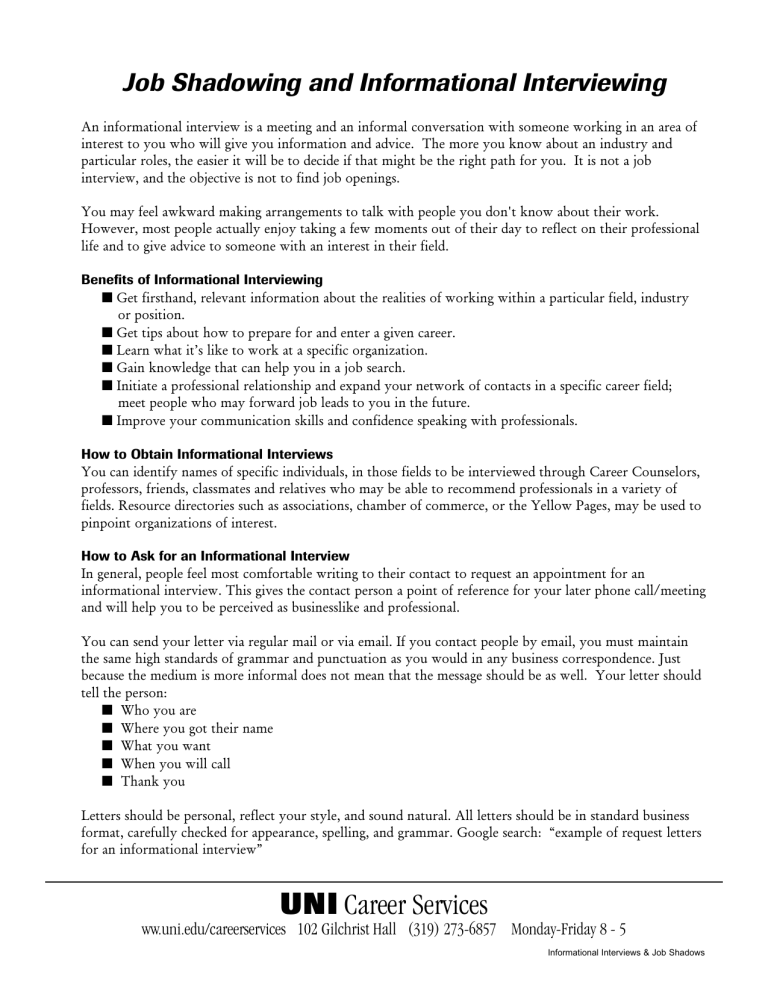
Job Shadowing and Informational Interviewing
An informational interview is a meeting and an informal conversation with someone working in an area of interest to you who will give you information and advice. The more you know about an industry and particular roles, the easier it will be to decide if that might be the right path for you. It is not a job interview, and the objective is not to find job openings.
You may feel awkward making arrangements to talk with people you don't know about their work.
However, most people actually enjoy taking a few moments out of their day to reflect on their professional life and to give advice to someone with an interest in their field.
Benefits of Informational Interviewing
Get firsthand, relevant information about the realities of working within a particular field, industry or position.
Get tips about how to prepare for and enter a given career.
Learn what it’s like to work at a specific organization.
Gain knowledge that can help you in a job search.
Initiate a professional relationship and expand your network of contacts in a specific career field; meet people who may forward job leads to you in the future.
Improve your communication skills and confidence speaking with professionals.
How to Obtain Informational Interviews
You can identify names of specific individuals, in those fields to be interviewed through Career Counselors, professors, friends, classmates and relatives who may be able to recommend professionals in a variety of fields. Resource directories such as associations, chamber of commerce, or the Yellow Pages, may be used to pinpoint organizations of interest.
How to Ask for an Informational Interview
In general, people feel most comfortable writing to their contact to request an appointment for an informational interview. This gives the contact person a point of reference for your later phone call/meeting and will help you to be perceived as businesslike and professional.
You can send your letter via regular mail or via email. If you contact people by email, you must maintain the same high standards of grammar and punctuation as you would in any business correspondence. Just because the medium is more informal does not mean that the message should be as well. Your letter should tell the person:
Who you are
Where you got their name
What you want
When you will call
Thank you
Letters should be personal, reflect your style, and sound natural. All letters should be in standard business format, carefully checked for appearance, spelling, and grammar. Google search: “example of request letters for an informational interview”
UNI
`~êÉÉê=pÉêîáÅÉë
ïïKìåáKÉÇìLÅ~êÉÉêëÉêîáÅÉë===NMO=dáäÅÜêáëí=e~ää===EPNVF=OTPJSURT====jçåÇ~óJcêáÇ~ó=U=J=R
Informational Interviews & Job Shadows
The Meeting
Dress appropriately.
A suit is not necessary, but dress nicely. Even though you are not going for a job interview, making an impression is still important. You are building your network for the future.
During the meeting.
Be considerate of your mentor's time and space. If you have arranged for half an hour, try to keep the meeting within that time frame (but feel free to stay longer if your mentor offers). If your visit is interrupted by a phone call or visitor, offer to step out of the room until the mentor is free.
Ask open-ended questions...
that require more than one- or two-word answers. Organize your questions in order of importance to you, so that if you run out of time, you have the information you wanted most.
Take notes.
Ask for permission before taking notes. Most mentors will not mind and will be pleased that you are serious about the interview.
Thank the mentor...
for his/her time when the conversation concludes. Ask for a business card if you haven't already been given one. Follow up with a thank you letter within a few days.
After your visit.
There are two basic things to do after meeting with a mentor, whether the meeting was for an informational interview, job shadowing, or a short-term project: thank the mentor in writing reflect on your experience to see what conclusions or actions it suggests.
Suggested Questions to Ask
The important thing is to think about what you really want to know. Take a written list of questions with you to the meeting. Following are some suggestions.
Preparation and Career Path:
What majors would employers in this field prefer? Is graduate study required or recommended? If so, in what fields of study?
What kinds of experience do employers want?
Are there minors or electives or special areas of knowledge/skills that would be helpful?
What is the typical career path in this field? What are the entry-level positions?
Structure/Culture:
What is the management style in this organization?
How are decisions made? Do people feel included in the process?
Is there a dress code?
What is a typical day like?
What are normal work hours?
Do people work long hours? Is there flexibility? Do people take vacations?
How would you describe the pace and cycle of work in this area?
Suggested Questions to Ask (continued)
Success Factors
What are the characteristics and competencies of people who are successful in this field?
What does it take to be successful in this type of career?
What type of person is best suited to the work in this area?
What specific functional or technical knowledge is critical to this work?
Education, Training & Skills
What are the basic prerequisites for jobs in this field?
What particular skills or talents are most essential to be effective in this job?
How did you learn these skills?
What are the educational requirements for this position or field? Is graduate school recommended/required?
What jobs and experiences have led you to your present position?
Compensation
What are the typical salary ranges in this profession? Entry? Mid-level? Senior level?
Aside from such tangible compensation as money, fringe benefits, travel, etc., what kinds of satisfaction and reward does this profession yield?
Future of the Field:
Where do you see this field going in the future? Any problems? Increased/decreased demand?
Are there any opportunities for advancement?
Is there high turnover?
Where are the best opportunities for this job/field (geographically)?
Advice:
What do you look for in an applicant for this job?
Would you have done anything different?
How can I get experience/break into this field? Where should I look?
What is the best way to find jobs in this field?
Is there anyone else that I should talk to?
Questions to Avoid:
Avoid questions of a personal or sensitive nature. For example:
Not OK OK
What is your salary?
I hear you may be seeing layoffs soon.
How do you get along with your boss?
How well do you like your job?
What would be a typical starting salary for this sort of position?
What do you see as the outlook for this field over the next year or so?
What are some ways in which employees here interact with each other?
What parts of your job do you like best? Least?
